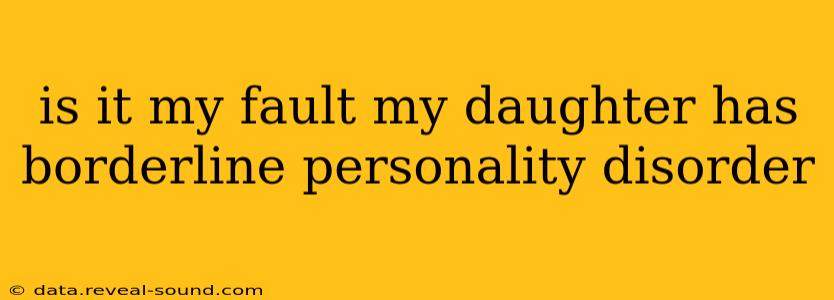Is It My Fault My Daughter Has Borderline Personality Disorder?
It's a heartbreaking question, and one many parents grapple with when their child receives a diagnosis of Borderline Personality Disorder (BPD). The short answer is: no, it's not your fault. BPD is a complex mental illness with multiple contributing factors, and blaming yourself won't help your daughter or you.
However, understanding the contributing factors can be helpful in supporting your daughter's journey to recovery and fostering a healthier relationship. Let's delve into the complexities of BPD and address some common parental concerns.
What Causes Borderline Personality Disorder?
BPD isn't caused by a single event or factor. Instead, it's believed to be a result of a combination of genetic predisposition, environmental influences, and possibly brain chemistry imbalances.
- Genetics: Research suggests a hereditary component. If a family member has BPD or other mental illnesses, the risk is increased. This doesn't mean it's inevitable; it simply means the risk is higher.
- Environment: Early childhood experiences, such as trauma, abuse (physical, emotional, or sexual), neglect, or inconsistent parenting, can significantly contribute to the development of BPD. This doesn't equate to blame; children are resilient, but certain adverse experiences can impact their development.
- Brain Chemistry: Imbalances in neurotransmitters, the brain's chemical messengers, are also thought to play a role. This is an active area of research.
It's crucial to understand that even if there were instances of challenging parenting or difficult circumstances, your daughter's BPD is not solely your responsibility. Many individuals experience similar challenges without developing BPD. The interplay of genetic and environmental factors is complex and not fully understood.
Did My Parenting Style Contribute to My Daughter's BPD?
This is a natural and understandable concern. Parents often question their parenting choices, especially when their child struggles with a mental illness. While certain parenting styles might increase vulnerability, it’s inaccurate to say they cause BPD. For example, inconsistent parenting or a chaotic home environment can be stressful for children, making them more susceptible to developing mental health challenges. However, many children exposed to similar environments don't develop BPD.
It's important to remember that:
- You did the best you could with the resources you had at the time. Parenting is challenging, and everyone makes mistakes.
- Focusing on blame is unproductive. It hinders both your own healing and your ability to support your daughter effectively.
- Seeking professional help is crucial. A therapist can help you process your feelings and develop healthy coping mechanisms.
How Can I Best Support My Daughter?
Supporting a daughter with BPD requires patience, understanding, and professional guidance. Here are some key steps:
- Educate yourself about BPD: Understanding the disorder will equip you to better support your daughter.
- Seek therapy for yourself: Processing your feelings and learning healthy coping mechanisms will benefit both you and your daughter.
- Encourage your daughter to seek professional help: Therapy, particularly Dialectical Behavior Therapy (DBT), is highly effective in treating BPD.
- Practice healthy communication: Learn to communicate calmly and assertively, avoiding arguments and emotional escalations.
- Set healthy boundaries: This is vital for both your well-being and your daughter's progress.
Remember, you are not alone. Many parents face similar challenges. Support groups, professional therapists, and online resources can offer valuable assistance and guidance. Focusing on understanding BPD, seeking professional help, and practicing self-care will be significantly more beneficial than dwelling on guilt or self-blame.
